-
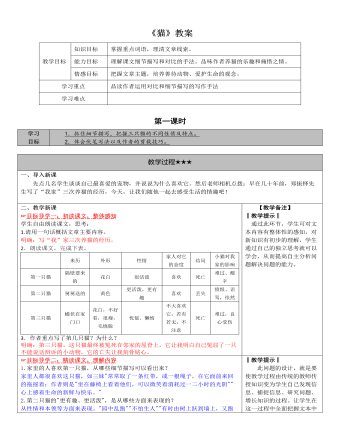
部编版语文七年级上册《猫》教案
目标导学二:精读课文,理解内容1.家里的人喜欢第一只猫,从哪些细节描写可以看出来?家里人都很喜欢这只猫,如三妹"常常取了一条红带,或一根绳子,在它面前来回的拖摇着;作者则是"坐在藤椅上看着他们,可以微笑着消耗过一二小时的光阴""心上感着生命的新鲜与快乐。"2.第二只猫的"更有趣、更活泼",是从哪些方面来表现的?从性情和本领等方面来表现。"园中乱跑""不怕生人""有时由树上跃到墙上,又跑到街上"等是表现它的性情;"会爬树""捉蝴蝶""会捉鼠"。3.第三只猫的“可厌”,是从哪些方面来描写的?是从形态和性情等方面来写的。“不好看,又很瘦”“毛被烧脱了好几块”“忧郁”“懒惰”。4.“我”根据什么判定芙蓉鸟是这只猫咬死的?是谁咬死了芙蓉鸟?根据是什么?“那只花白猫对于这一对黄鸟,似乎也特别注意,常常跳到桌子上对鸟笼凝望着。”是只凶恶的黑猫把鸟咬死。根据是:“一只黑猫飞快的逃过露台,嘴里衔着一只黄鸟”。5.为什么“我”对于第三只猫的死亡比前两只猫的亡失更“难过得多”?
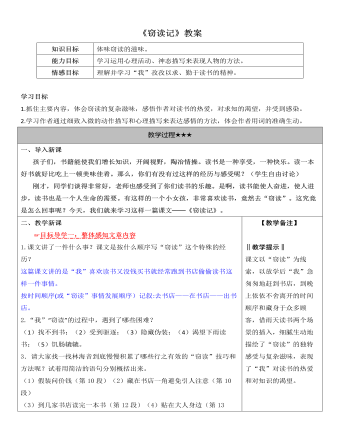
部编版语文七年级上册《窃读记》教案
(2)有时我贴在一个大人的身边,仿佛我是与他同来的小妹妹或者女儿。“贴”字形象地描绘出“我”躲在大人身边窃读的情形,出神入化地反映了“我”害怕被哄赶,又不愿意离开书店的心情。(3)我慌忙把眼睛送上书架,装作没看见。“送上”一词形象地描绘出“我”躲避店员时的慌乱与惧怕。3.理解下面句子的含义(1)记住,你是吃饭长大的;读书长大;也是在爱里长大的。吃饭长大,是人的生存需要;读书长大,是“我”在窃读过程中,不断获得知识,“我”的精神世界变得丰富、精彩;而后一次“窃读”,店员明知“我”不会买书,却依然留书给“我”“借读”。让我领悟了“爱”的真谛,也最终懂得了“我是在爱里长大的”。(2)我很快乐,也很惧怕---这种窃读的滋味!“我”在阅读中感受着书籍所带来的智慧与快乐,却时刻害怕被店员或老板发现受到训斥和哄赶,这种书内世界的吸引与沉迷,书外世界的担忧与紧张,使快乐与惧怕紧密地交织在一起,形成一种复杂的、难以言说的感受,正是窃读的滋味。
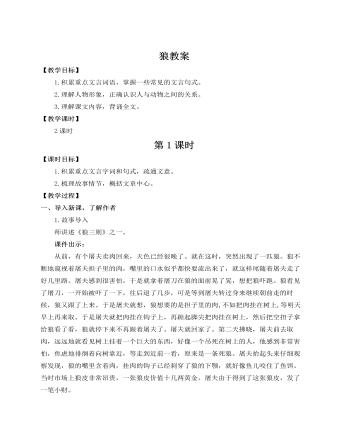
人教部编版七年级语文上册狼教案
(学生交流,教师引导,总结方法)(1)方法1:主谓之间要停顿。【示例】一狼/得骨/止;其一/犬坐于前。(2)方法2 :谓语与宾语之间要停顿。【示例】顾/野有麦场;乃悟/前狼/假寐 。(3)方法3:连词前面可以停顿。【示例】后狼止/而前狼又至;意将/隧入/以攻其后也。(4)方法4 :发语词后面要停顿。【示例】盖/以诱敌。(全班齐读课文,读顺文章)师小结:理解文意,固然可以运用停顿技巧,但最重要的方法是弄懂字词大意、文句意思。理解了文意,才能读准句读,有利于我们读顺文章。【设计意图】本环节旨在通过学习互助的方式,调动学生的学习热情,充分发挥学生的学习积极性和主动性,进而理解文意,读顺文章。教师及时点拨,适时归纳文言释词方法、句式和停顿划分小技巧,实现知识学习与技能掌握的统一。四、细读课文,读懂内容1.概括文章情节文章讲述了屠户杀狼的故事。按照事件的发展,情节一般可以分为开端(发生)、发展、高潮和结局。请同学们细读课文后,用词语概括这个故事的发展经过。(生交流后,师明确)
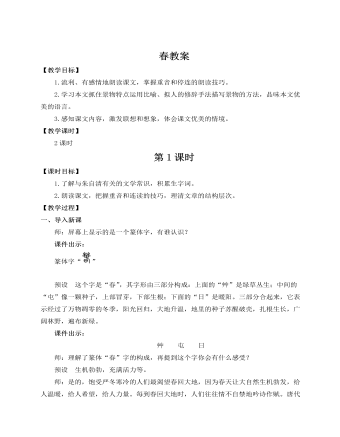
人教部编版七年级语文上册春教案
本文具有很强的画面感,凸显出绘画美,虽是散文,却满贮诗意,正是文中有画,画中有诗。作者从色泽、层次和动态上向人们展示了一幅栩栩如生的春景图。作者笔下的春景图色泽鲜艳,不仅有象征希望的“嫩嫩的,绿绿的”小草,还有“红的像火,粉的像霞,白的像雪”的繁花,也有温暖的“红红的”太阳的脸和“黄晕的”灯光,这些色彩描绘出了一个生机勃勃而又安静祥和的春天。在描写春景的时候,作者还通过有层次感的描写使景物意蕴悠长,例如对春雨的描写是从“人家屋顶上”到“小路上”“石桥边”再到“地里”,从远至近,层次分明。另外,朱自清使用精妙的语言向读者展示了动态(生机)美,在他笔下,花是“赶趟儿”的,蜜蜂是“闹着”的,气味儿是“酝酿”的,一切都是“生长着”的,洋溢着盎然的生机。作者从总体上描绘春景,大地回春、万物复苏的景象就活生生地展现在了读者眼前。

新人教版高中英语必修3Unit 5 The Value of Money- Discovering Useful Structure教学设计
Step 3 Meaning1. 过去将来时表示从过去某一时间来看将要发生的动作或存在的状态, 常用在宾语从句中。一般由“would/should +动词原形”构成。She hoped that they would meet again someday. 她希望将来有一天他们能再见面。2. was/were going to+动词原形: 表示过去将要发生或很有可能发生的动作, 常用于口语中, 表示预言、意图或者打算等。He was going to start work the following week. 他打算下星期开始工作。3. was/were about to do: 常用来表示即将发生的动作, “刚要/正要做……”。注意该结构不与任何时间状语连用。I felt that something terrible was about to happen. 我感到某种可怕的事情即将发生。4.was/were to do: 表示“曾计划做某事”, 如果表示“本来计划做某事, 动作没实现”, 则需用 “was/were to have done”。She said she was to have told me about the accident. 她说她本来想告诉我关于事故的事。5.Start, go, come, leave, see, meet等动词的过去进行时: 表示就过去某一时刻而言即将发生的动作。She was coming later. 她随后就来。I had just put on my overcoat and was leaving to visit a friend of mine. 我刚穿上外套要去看我的一个朋友。

新人教版高中英语必修3Unit 5 The Value of Money-Listening &Speaking&Talking教学设计
4. A:We’d like to have someone to say a word at the beginning to welcome the group.B:↙Who?A:We thought that you or Dr.Johnson might do it.B用降调说Who,其意思是问,对方想让谁在开场时致欢迎词。Step 6 Pronunciation---Practice1. Listen to the short conversation and mark the intonation with ↗, ↙ or ↙, ↗. Then discuss with a partner what they intend to convey by using different intonation.Owner: You know what ?↗ It’s a million-pound bank note↙.Waiter 1: Really ?↗(question)Waiter 2: Really !↙(unbelievable and surprised)Waiter 3: Really ?!↙↗(first question then surprised)2. Listen to the conversations. Underline the parts that are stressed and mark the intonation. Then talk about the implied meanings of the responses with different intonations. Listen again and repeat.1) Henry: It’s a nice suit.Owner: Oh, it’s perfect!↙(The intonation means it is very suitable for Henry.)2) Henry: Well, that’s very kind of you.Owner: Kind, sir ?↗(what you said is not right) No, it’s kind of you. You must come whenever you want and have whatever you like. Just having you sit here is a great honour !!↙(welcome you to come again)3)Henry:Well, to be honest, I have none. Oliver:(happily) What luck!(excited) Brother↗, what luck!↙(It means “Didn’t you hear it?”)Henry: Well, it may seem lucky to you but not to me!↗(angry) If this is your idea of some kind of joke, I don’t think it’s very funny. Now if you’ll excuse me, I ought to be on my way.↙(If so, I would leave.)Roderick: Please don’t go↙...(hope Henry can wait for a moment)Part B Viewing and Talking---Describe people’s changing attitudes in a film clipStep 1 Before-listening---Tell the filmYou are going to watch part of the film The Million Pound Bank Note. Look at these photos and guess what happens in the film.

新人教版高中英语必修3Unit 5 The Value of Money-Listening &Speaking教学设计
Step 4: Listen again and decide if the following statements are true (T) or false (F).1 It was the first time Chen Liyan's story was reported. T口 F口2 Chen found 10,000 yuan in a small plastic bag in Taiyuan railway station口 F口3 Wang Zheng apologized to Chen because he couldn't offer her more money. T口 F口4 Chen took out a large loan to cure her daughter, T口 F口5 Wang set up a fundraising website for Chen's daughter after Chen told him about her situation. T口 F口Step 5:After listening, discuss the questions.1 What kind of person do you think Chen Liyan is?Chen Liyan is generous and honest because she returned a large sum of money to the owner.2 Did Chen return the money because she didn't need it?No. She returned the money because it was the right thing to do. Evidence for this is that she refused to accept the reward money because she felt that it had not been earned. 3 Is it common for people to do what Chen did?It depends on the culture. In some countries it is quite common to return money that has been found. In other countries, people believe "Finders are keepers!" 4 How did Wang Zheng feel about the return of his money?He must have been very happy and relieved to have gotten his money back. We know this because he thanked Chen repeatedly and even offered her a reward.5 Why did Ma Dongbao tell Wang about Chen's family?He must have had great sympathy for Chen and her daughter and wanted to help them.'We know this because he arranged help for them. 6 How did the news reporter feel about Chen's actions?The news reporter felt that it showed that money wasn't the most important thing in life. We know this because the reporter told us that this is what Chen believes. and then said, “that's a great attitude to take."

新人教版高中英语必修3Unit 5 The value of money-Reading and Thinking教学设计二
? Could you offer me some kind of work here?? I don’t want your charity, I just want an honest job.? Careless: I landed in Britain by accident.Step 7:Consolidation.? Find Henry? Roderick and Oliver were I .making a bet when they saw Henry, a poor young man. ? Know Henry? About a month ago, Henry was sailing and later he found himself carried out to sea by a strong wind. Fortunately, he 2.was spotted by a ship. And it was the ship that brought him to 3.England? Offer money to Henry ? Oliver and Roderick gave Henry a letter and told him that there was money in it. They 4.persuaded him to accept it, and made him 5.promise that it wouldn't be opened until 2 o'clock.Step 8:Language pointsa large amount of: a large quantity of; a great deal ofe.g. They bought a large amount of furniture before they moved their new house.make a bet: make an arrangement to risk money, etc. on an event of which the result is doubtful.e.g. We made a bet on the result of the match.permit sb to do something: allow somebody to do somethinge.g. My mother doesn’t permit me to ride in the street after it rained.by accident: as a result of chancee.g. I only found it by accident.stare at: look at somebody or something with the eyes wide open in a fixed gaze( in astonishment, wonder, fear, etc)to be honest: to tell you the truth; to be franke.g. To be honest, I don’t think we have a chance of winning.Step7 Homework:What do you think will happen to Henry? Will the bank-note help him or get him into trouble?

新人教版高中英语必修3Unit 5 The Value of Money-Reading and Thinking教学设计一
Everybody wants to get wealth.In today’s material world,making money or becoming wealthy symbolizes a person’s success and capability. Many people just make every effort, pay any price to attain greater wealth. With money,they can buy nice, large apartments in nice neighborhood. With money they can own luxurious cars. Wealth seems to bring all happiness in life.But is wealth the only road to happiness? Not really. There are many things in the world, which are beyond the means of money, such as friendship, love, health and knowledge. People are so preoccupied with struggling for money that they have no time or would not take the time to form or maintain friendship. What happiness can they feel living as lonely miserable creatures without love or friends in the world even if they accumulate tremendous wealth?In my opinion, people can’t do anything without money, but money is not everything. What money will bring you depends on your personal belief and goal in life. If you are kind enough to help others, especially the poor, money is a good thing to you. With it, you can do much more for the benefit of people and your country, and it will add to your own happiness. If you want money just for your own needs, you’ll never be satisfied or happy. In a word,you should have money spent for more people. Only then can money be the source of your happiness.Step 8 Homework4 students in a group, one acts Roderick, one Oliver, one servant and the fourth one acts Henry Adams, then listen to the tape, pay more attention to the difference between American English and British English in pronunciation, stress, tone.

新人教版高中英语必修3Unit 5 The Value of Money-Reading for Writing教学设计二
2. 您能看到, 我头发太长了。You can see that my hair is much too long.3. 无论什么时候, 只要您想回来就回来。Please come back whenever you want.4. 您仅有很少的头发要理! You only have too little hair to cut !5. 为您服务是我的荣幸!It is my honour to serve you!Step 9 Writing(Henry is walking down the street when he sees a sign for a place that cuts hair. He decides to have it cut. )H=Henry B=BarberH: Good afternoon, I’d like to have my hair cut, if I may. (The barber looks at Henry’s hair and continues cutting another man’s hair. ) Er, I’d really like a haircut. As you can see it’s much too long. B: (in a rude manner) Yes, I can see that. Indeed, I can. H: Fine, well, I’ll have a seat then. (He sits in one of the barber’s chairs. The barber turns to look at Henry. )B: It’s quite expensive here, you know! Are you sure you can afford it?H: Yes. I think so. (After his hair is cut, the barber tells Henry how much he must pay. Henry shows the barber the bank note. )B: Why Mr. . . (looks shocked)H: Adams. Henry Adams. I’m sorry. I don’t have any change. B: Please don’t worry! (wearing a big smile) Nothing to worry about! Nothing at all! Please come back whenever you want, even if you only have too little hair to cut! It will be my honour to serve you!Step 10 Pair workExchange drafts with a partner. Use this checklist to help your partner revise his/her draft.1. Are all the elements of a play included and in good order ?2. Do the character use suitable language ?3. Are the stage directions clear and useful ?4. Is the plot clear and exciting enough ?

新人教版高中英语必修3Unit 5 the value of money-Reading For Writing教学设计一
【参考范文】Narrator:(Henry is smiling as he leaves the restaurant. As he is walking down the street, he sees a sign for a place that cuts hair. He decides to get it cut. )H=Henry;B=Barber;R=rude manH:Good afternoon, I'd like to get a cut, if I may. (The barber looks at Henry's hair and continues cutting another man's hair. )Er, I'd really like a haircut. As you can see it's much too long. B:(in a rude manner) Yes, I can see that. Indeed, I can. H:Fine, well I'll have a seat then. (He sits in one of the barber's chairs. The barber turns to look at Henry. )B:It's quite expensive here, you know!Are you sure you can afford it?H:Yes. I think so. (In comes the rude man. )R:Hey you there. I need a haircut quickly. Can you do me straightaway?B:All right, then, get in the chair and I'll see what I can do. R:Thank you. (sits down in one of the barber's chairs)H:Excuse me, but I was here first. Aren't you going to do my hair first?B:This man's in a hurry. H:Well so am I!I insist that you cut my hair first. B:OK, but I'll have to be quick. This gentleman is waiting. H:Thank you. (They both become quiet. After his hair is cut, the barber tells Henry how much he must pay. Henry shows the barber the bank note. )B:Why, Mr . . . (looks shocked)H:Adams. Henry Adams. I'm sorry, I don't have any change. R:You're that Mr Adams! Well,I'm glad I waited or I might never have known it was you. B:Why, Mr Adams, please don't worry!(wearing a big smile) Nothing to worry about!Nothing at all!Please come back any time, even if you only need too little hairs cut!It will be my honour to serve you!

新人教版高中英语选修2Unit 5 First Aid-Discovering useful structures教学设计
You have no excuse for not going.你没有理由不去。He was punished for not having finished his homework.他因未完成作业而受到惩罚。2.动词ing形式复合结构由物主代词或人称代词宾格、名词所有格或普通格加动词ing,即“sb./sb.'s+doing”构成。动词ing形式的复合结构实际上是给动词ing形式加了一个逻辑主语。动词ing形式的复合结构有四种形式:①形容词性物主代词+动词ing②名词所有格+动词ing③代词宾格+动词ing④名词+动词ingHer coming to help encouraged all of us.她来帮忙鼓舞了我们所有人。The baby was made awake by the door suddenly shutting.这个婴儿被突然的关门声吵醒了。Can you imagine him/Jack cooking at home?你能想象他/杰克在家做饭的样子吗?无生命名词无论是作主语还是作宾语都不能用第②种形式。Tom's winning first prize last year impressed me a lot.汤姆去年得了一等奖使我印象深刻。Do you mind my/me/Jack's/Jack leaving now?你介意我/杰克现在离开吗?Excuse me for my not coming on time.很抱歉我没能按时来。His father's being ill made him worried.他父亲病了,他很担心。We are looking forward to the singer's/the singer to give us a concert.我们盼望着这位歌手来给我们举办一场演唱会。
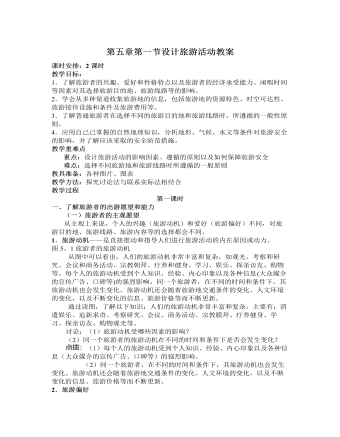
人教版高中地理选修3第五章第一节设计旅游活动教案
点拨:旅游地旅游资源的特色不同,可以安排的旅游活动是不一样的,直接影响对旅游者的吸引力。因此,出游前首先就需要收集旅游地旅游资源的类型、主要游览景区、景点的特色等情况。旅游地的时空可达性直接关系到旅游者从出发地到旅游地,然后再返回出发地的费用和时间。一般来说,居住地与旅游地之间的空间距离过大,会使旅行的时间过长、旅行费用过高,经济距离增加,相应地降低了旅游者的出游能力。而居住地与旅游地相距遥远,也意味着两地之间巨大的环境差异,这会增加对游客的吸引力。旅游服务设施和条件,如旅游交通方式及工具、旅游住宿条件、旅游餐饮的种类和标准、导游服务、旅行费用等信息也都在一定程度上影响着游客的选择。图5.3西藏布达拉宫和图5.4云南香格里拉两幅图片显示了西藏布达拉宫、云南香格里拉与众不同的优美景观,吸引了众多的游客前来观光旅游,成为近年来国内旅游的热点。
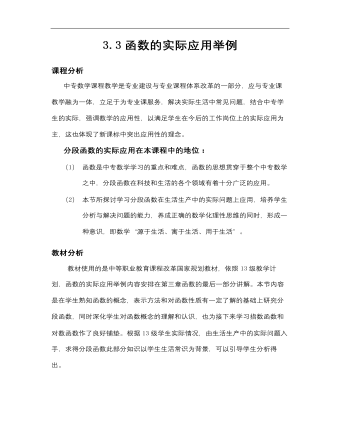
【高教版】中职数学基础模块上册:3.3《函数的实际应用举例》教学设计
课程分析中专数学课程教学是专业建设与专业课程体系改革的一部分,应与专业课教学融为一体,立足于为专业课服务,解决实际生活中常见问题,结合中专学生的实际,强调数学的应用性,以满足学生在今后的工作岗位上的实际应用为主,这也体现了新课标中突出应用性的理念。分段函数的实际应用在本课程中的地位:(1) 函数是中专数学学习的重点和难点,函数的思想贯穿于整个中专数学之中,分段函数在科技和生活的各个领域有着十分广泛的应用。(2) 本节所探讨学习分段函数在生活生产中的实际问题上应用,培养学生分析与解决问题的能力,养成正确的数学化理性思维的同时,形成一种意识,即数学“源于生活、寓于生活、用于生活”。教材分析 教材使用的是中等职业教育课程改革国家规划教材,依照13级教学计划,函数的实际应用举例内容安排在第三章函数的最后一部分讲解。本节内容是在学生熟知函数的概念,表示方法和对函数性质有一定了解的基础上研究分段函数,同时深化学生对函数概念的理解和认识,也为接下来学习指数函数和对数函数作了良好铺垫。根据13级学生实际情况,由生活生产中的实际问题入手,求得分段函数此部分知识以学生生活常识为背景,可以引导学生分析得出。
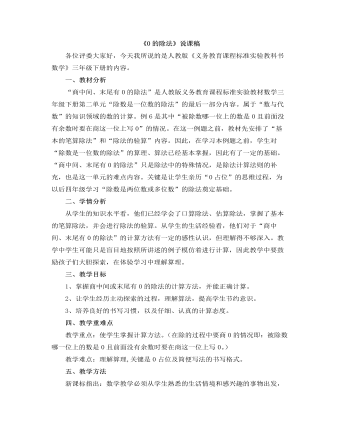
小学数学人教版三年级下册《0的除法》说课稿
一、教材分析“商中间、末尾有0的除法”是人教版义务教育课程标准实验教材数学三年级下册第二单元“除数是一位数的除法”的最后一部分内容。属于“数与代数”的知识领域的数的计算。例6是其中“被除数哪一位上的数是0且前面没有余数时要在商这一位上写0”的情况。在这一例题之前,教材先安排了“基本的笔算除法”和“除法的验算”内容。因此,在学习本例题之前,学生对“除数是一位数的除法”的算理、算法已经基本掌握,因此有了一定的基础。“商中间、末尾有0的除法”只是除法中的特殊情况,是除法计算法则的补充,也是这一单元的难点内容。关键是让学生亲历“0占位”的思维过程,为以后四年级学习“除数是两位数或多位数”的除法奠定基础。
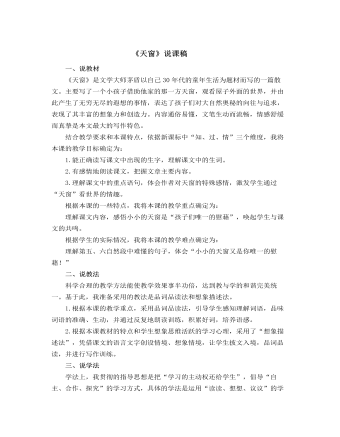
部编人教版四年级下册《天窗》说课稿
二、说教法科学合理的教学方法能使教学效果事半功倍,达到教与学的和谐完美统一。基于此,我准备采用的教法是品词品读法和想象描述法。1.根据本课的教学重点,采用品词品读法,引导学生感知理解词语,品味词语的准确、生动,并通过反复地朗读训练,积累好词,培养语感。2.根据本课教材的特点和学生想象思维活跃的学习心理,采用了“想象描述法”,凭借课文的语言文字创设情境、想象情境,让学生披文入境,品词品读,并进行写作训练。三、说学法学法上,我贯彻的指导思想是把“学习的主动权还给学生”,倡导“自主、合作、探究”的学习方式,具体的学法是运用“读读、想想、议议”的学习方法,通过朗读课文,品词析句、展开联想等多种途径,训练语言表达、思维、朗读的能力,积累规范语言,体味作品的语言美。此外我准备用多媒体手段辅助教学。
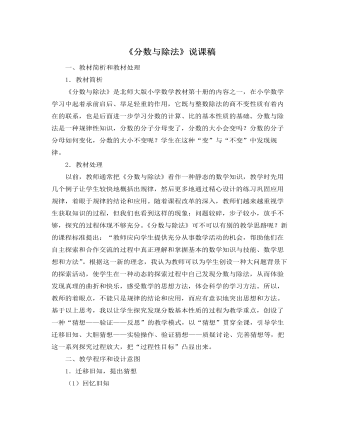
北师大版小学数学五年级上册《分数与除法》说课稿
(1) 讨论——选择。教师精心安排了两个环节,一是让学生讨论、选择一个喜欢的分数作为研究对象,二是让学生讨论、选择不同的实验材料,确定不同的验证方法,然后全班汇报。教师给每组准备了一个材料篮,里面装着计算器、钟表、数张纸、线段图、彩笔、直尺等。各小组经过热烈的讨论标新立异地选择了不同的分数作为研究对象、选择不同的材料作为实验器材,一个个跃跃欲试。学生可能会选择折纸涂色、画线段图、用计算器计算、看直尺、看钟面等不同的方法去证明两个分数是否相等。设计意图:这样设计,既是为后面的实验做好准备,避免学生出现盲目行动,同时也是为学生探究方法的多元化创造条件。(2)实验——记录:各组拿出实验报告,开始做实验,并记录实验结果。(3)汇报——交流:分组在实物投影仪上,展示实验报告,说明验证方法。学生可能会出现多种多样的实验报告。(投影)
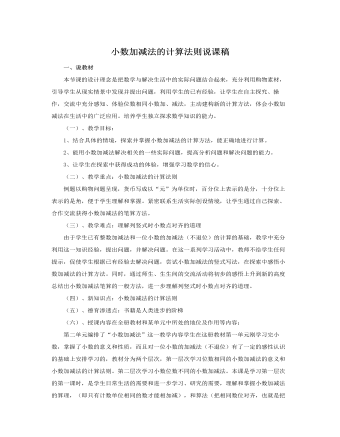
人教版新课标小学数学四年级下册小数加减法的计算法则说课稿
(3)引导总结小数加减法计算方法。引导概括出:计算小数加减法时要把相同数位上的数对齐,也就是要把小数点对齐。(4)看书36页 读小数加减法计算方法(三)拓展练习:1.用竖式计算 4.37+2.93 7.54+6.84【设计意图】练习的目的是巩固算法,同时暴露新的认知冲突,计算结果末尾有“0”,正确处理“0”的问题。学生发现问题,提出解决办法,教师引导学生根据小数的性质,正确认识和掌握计算结果末尾有“0”的时候要化简,即划掉末尾的“0”的问题。2.解决实际问题课件出示【设计意图】解决身边的问题,体会新知识源于生活,服务于生活。在解决问题中使学生进一步理解小数加减法的意义,正确计算小数加减法,掌握新的本领。(四)、课堂小结:分为两部分,先看书36页,整理所学知识;再由学生谈收获、谈体会。归纳总结是否达到知识情感的预定目标。
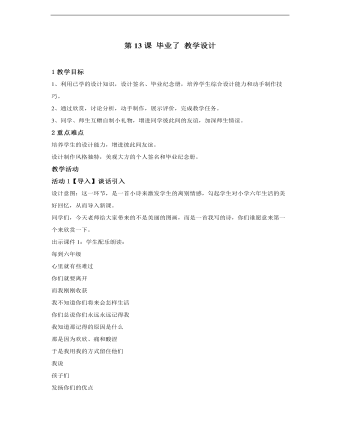
小学美术人教版六年级下册《第13课毕业啦》教学设计说课稿
活动1【导入】谈话引入设计意图:这一环节,是一首小诗来激发学生的离别情感,勾起学生对小学六年生活的美好回忆,从而导入新课。同学们,今天老师给大家带来的不是美丽的图画,而是一首我写的诗,你们谁愿意来第一个来欣赏一下。出示课件1:学生配乐朗读:每到六年级心里就有些难过你们就要离开而我刚刚收获我不知道你们将来会怎样生活你们总说你们永远永远记得我
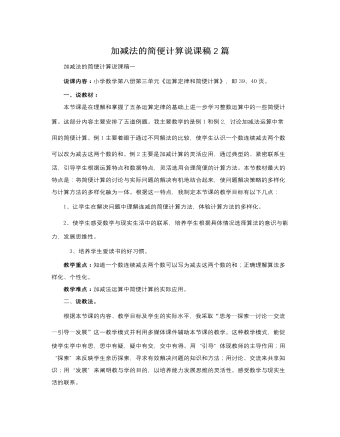
人教版新课标小学数学四年级下册加减法的简便计算说课稿2篇
一、说教材:本节课是在理解和掌握了五条运算定律的基础上进一步学习整数运算中的一些简便计算。这部分内容主要安排了五道例题。我主要教学的是例1和例2,讨论加减法运算中常用的简便计算。例1主要着眼于通过不同解法的比较,使学生认识一个数连续减去两个数可以改为减去这两个数的和。例2主要是加减计算的灵活应用,通过典型的、紧密联系生活,引导学生根据运算特点和数据特点,灵活选用合理简便的计算方法。本节教材最大的特点是:将简便计算的讨论与实际问题的解决有机地结合起来,使问题解决策略的多样化与计算方法的多样化融为一体。根据这一特点,我制定本节课的教学目标有以下几点:1、让学生在解决问题中理解连减的简便计算方法,体验计算方法的多样化。2、使学生感受数学与现实生活中的联系,培养学生根据具体情况选择算法的意识与能力,发展思维性。



